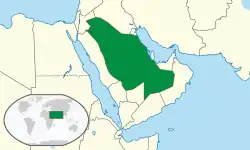Sultanate of Nejd
The Sultanate of Nejd (Arabic: سلطنة نجد, Salṭanat Najd) was the third iteration of the Third Saudi State, from 1921 to 1926. It was a monarchy led by the House of Saud, and a legal predecessor of modern-day Saudi Arabia. This version of the Third Saudi State was created when Abdul Aziz ibn Saud, Emir of Riyadh, declared himself sultan over Nejd and its dependencies.[1] On the 2 December 1922, the Nejd signed an agreement with Kuwait defining their border with each other. The border would be a straight line along the 29th parallel.[2] In December 1925, the Kingdom of Hejaz surrendered to the forces of Abdul Aziz ibn Saud, who was thereafter proclaimed king of Hejaz in January 1926 and merged his dominions into the Kingdom of Hejaz and Nejd.
Sultanate of Nejd سلطنة نجد Salṭanat Najd | |||||||||||||
|---|---|---|---|---|---|---|---|---|---|---|---|---|---|
| 1921–1926 | |||||||||||||
 | |||||||||||||
 Sultanate of Nejd | |||||||||||||
| Capital | Riyadh | ||||||||||||
| Common languages | Arabic | ||||||||||||
| Religion | Sunni Islam (Wahhabism) | ||||||||||||
| Demonym(s) | Nejdi | ||||||||||||
| Government | Islamic absolute monarchy | ||||||||||||
| Sultan | |||||||||||||
• 1921–1926 | Abdul Aziz ibn Saud | ||||||||||||
| Viceroy | |||||||||||||
• 1921-26 | Faisal (Arar) | ||||||||||||
• 1921-26 | Saud (Najd) | ||||||||||||
• 1921-26 | Nasser (Ahsa) | ||||||||||||
| Legislature | None (rule by decree) (until 1924) National Council (1924-1926) | ||||||||||||
| Historical era | Interwar period | ||||||||||||
• Established | 2 November 1921 | ||||||||||||
• Hejaz annexed | 8 January 1926 | ||||||||||||
| |||||||||||||
| Today part of | Saudi Arabia | ||||||||||||
References
- Madawi Al Rasheed. (2002). A History of Saudi Arabia. Cambridge, England, UK: Cambridge University Press, p. 63.
- "No. 1083 SULTANATE OF NEJD and KUWAIT" (PDF). 1922.
{{cite journal}}: Cite journal requires|journal=(help)
.svg.png.webp)